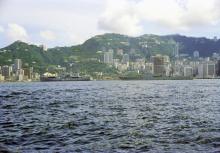22 Dec 1941, Chronology of Events Related to Stanley Civilian Internment Camp
Primary tabs
The ordeal of those captured in Kowloon continues.
Arthur Hamson and most of his fellow prisoners at the Hing Wah/Ying Wah College are up at 6 a.m. - they've been told they are to be moved today. They are taken by lorry to the Kowloon Hotel, arriving at about 2 p.m.. At 5.30 p.m. he writes to his wife Edith - 'life seems blacker now than it has ever been. We're 4 of us in a small room'.
Robin Boris Levkovich is also one of the party that is moved from the School to the Hotel. He lists some of the people he found already there:
Mr. Gale, ('American Red Cross Representative') / Mrs Lee ('who went on the peace mision') / Mr. Von Ness / Mr. and Mrs. Massber ('American') / Mr. Gingles and party ('the owner of the Palace Hotel').
George and Helen Kennedy-Skipton have generously opened their home to those in need. Tonight the group is told to move: the troops holding nearby Mt. Cameron are withdrawing, and they tell them to leave too. One of the party, Sally Refo, tells the story:
He {an officer of the Royal Scots} told us to get ready and they would have a truck there for us in a few minutes. Just as we went out with the children to get into the truck a shell hit the tennis court not more than twenty feet away but fortunately on higher ground and when the rest of us got up Harriet still lay there and I thought sure she was dead. She was only frightened. It was so dangerous that we decided we would stay in our house and take our chances. But the officer commanded us so strongly that we dared not disobey. While we hesitated the truck left. Ours was a wild flight, children, servants and excited adults all mixed in with the soldiers who were retreating in confusion. We feared the soldiers would be shelled or fired upon. We could not get away from them. The children were slow. We ran into barbed wire entanglements in the utter darkness. Mr. Skipton brought up the rear in his car and when we were able to turn from the soldiers' line of march he overtook us and picked up the children. At last we found a place to stop. We lay on the cold floor and rested in a house that the men from the billeting office knew was a good place. Why we did not take pneumonia I do not know. At day light we got up and found a place to live in. That was a dark moment. We had no food, no water, no bedding and only the clothing that we had on.
The tensest moments of the Repulse Bay Hotel siege arrive. It's been decided the soldiers at the Hotel will leave in the hope that this will save the civilians from massacre. The first attempt is through a drain, but this is so noisy that Major Templer decides to lead the rest to Stanley Fort along the road.
The soldiers line up and begin to slip out of the hotel in stockinged feet. A Swiss man, a neutral, feels impelled to share their fate; he asks for and is given a Volunteer uniform.
Many of these soldiers are to be killed, some after torture.
After the soldiers are gone, the Japanese enter the Hotel. One member of staff, 'the number one Boy' is bayoneted. The soldiers then approach the wounded with fixed bayonets, but Australian nurse Elizabeth Mosey blocks their way and they back down.
The front page of the Daily Mirror carries the headline:
Hong Kong Battle On Racecourse
The Express agrees:
Battle Raging For Hongkong Racecourse
The Mirror's story is based on a Japanese report, and it also mentions that the Japanese people have been told to refrain from 'excessive jubilation' when the fall of Hong Kong is announced.
The Chinese army is now described as fighting ten miles north of the border town of Shumchun. But even the most optimistic person with a loved one in Hong Kong must realise that the game's up and that there's nothing to hope for but capture and imprisonment rather than death.
In fact, on page 2 the columnist Cassandra is drawing conclusions from the 'swift and ominous fate' of Hong Kong and Penang as if it's already over for both places.
Sources:
Hamson: Allana Corbin, Prisoners of the East, 2002, 105
Levkovich: Statement, pages 4-5 (in the Ride Papers, held at the Hong Kong Heritage project and kindly sent to me Elizabeth Ride)
Kennedy-Skiptons: Sally Refo's Letter, available to members of the Yahoo Stanley Discussion Group: http://groups.yahoo.com/group/stanley_camp/messages
Repulse Bay: Tony Banham, Not The Slightest Chance, 2003, 207; Jan Marsman, I Escaped From Hong Kong, 1942, 68-73
Notes:
1) Levkovich gives the date of his move as 'about the 25th' and also lists Major Manners as already there: as Manners was still in the Repulse Bay Hotel on the 22 (see above), Levkovich was either transferred a little later than Hamson or was wrong to think Manners was in the Hotel before him. See also the entry for December 12.
'Von Ness' is Parker Van Ness, a Kai Tak mechanic and eventual escaper: http://gwulo.com/node/11296/backlinks
For more about E. F. Gingle: http://brianedgar.wordpress.com/2012/05/22/edward-gingle-at-war/

